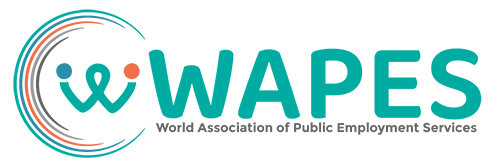The future of work after covid-19
WEBINAR@ET-DC@eyJkeW5hbWljIjp0cnVlLCJjb250ZW50IjoicG9zdF90aXRsZSIsInNldHRpbmdzIjp7ImJlZm9yZSI6IiIsImFmdGVyIjoiIn19@May 05, 2020The COVID-19 pandemic affected us all, both on an organizational and personal level. We had to adjust our ways of working quickly in order to continue to guarantee our services. Nevertheless, despite all these changes, we need to look ahead to the future and already think about how we can continue to adjust our policies and services to meet the demands of the labour market. On May 25, 2020, after welcome address by the President of WAPES, Mr Abdelmonime El Madani, moderated by Miguel PERROMINGO, 5 panellists were gathered to discuss the future of work after Covid-19.ProgramEdmond COLMAN AMOUSSOU , ANPE, Togo Challenges and opportunities on the labour market in Togo Youssef FENNIRA , ANETI, Tunisia ANETI's stakes and challenges in the face of the COVID crisis-19 Francisco José CAPARROS ALCARAZ, SOIB/SEPE, Spain PES measures to tackle Covid-19 effects in Spanish labour marketCountry: Belgium Region: EuropeAvailable documentsVideo presentation: The future of work after covid-19PDF document:The future of work after Covid-19
Swinging into action in response to the covid-19 pandemic
WEBINAR@ET-DC@eyJkeW5hbWljIjp0cnVlLCJjb250ZW50IjoicG9zdF90aXRsZSIsInNldHRpbmdzIjp7ImJlZm9yZSI6IiIsImFmdGVyIjoiIn19@June 29, 2020WAPES together with its partners International Labour Organization (ILO), Inter-American Development Bank (IDB) and SOCIEUX+, carried out a joint survey of the world's public employment to assess how they have adapted to the health and economic crisis following the Covid-19 pandemic, with the objective of anticipating the main lines of their actions in the coming months. This survey focused on four areas: Prevention and economic support Measures to maintain PES services Services organization measures Current or foreseeable problemsWebinar Objective:To share the first results of the joint survey and initiate a joint reflection on the main actions to be undertaken. Share the first results of the joint survey To share and enrich our thoughts on the adaptations of our organizations and the measures implemented in order to contain the effects of the crisis and to support the recovery.Target Audience:This webinar is aimed at all public employment services and particularly those who have contributed through their responses to this survey, their partners, at academics and anyone interested in employment and labour market issues. The web-conference will be available in English, French and Spanish.ProgramMr. Miguel Peromingo : Moderator Employment Policy Consultant Mr. Abdelmounaïm El Madani CEO of ANAPEC (Morocco) and President […]
Telework: opportunities and risks for our organisations and tomorrow’s labour market?
WEBINAR@ET-DC@eyJkeW5hbWljIjp0cnVlLCJjb250ZW50IjoicG9zdF90aXRsZSIsInNldHRpbmdzIjp7ImJlZm9yZSI6IiIsImFmdGVyIjoiIn19@September 28, 2020The Covid-19 pandemic has accelerated the practice of telework by forcing many companies and organisations to use it to maintain all or part of their activities. In response to a survey jointly carried out between April and May 2020 by WAPES, in partnership with the International Labour Organisation, the Inter-American Development Bank and SOCIEUX+, among 80 public employment services (PES) on all continents, more than 82% of the participants reported national measures to foster telework. This increase, which has had short-term effects, forcing organisations to make rapid or even improvised adjustments, has led to the active implementation of telework on a large scale. This flexibility has largely contributed to maintaining the essential activities of public employment services in periods of confinement. Today, questions are being raised about the future of telework, its impact on organisations, management methods, but also more generally on the evolution of skills, professions and the labour market (including the Gig economy).Purpose of our webinarOur objective is to share our knowledge about the reality of telework today and to learn from our experiences during the pandemic and look to the future, to : identify the most appropriate scenarios adapted to each organisational reality (sustainability or […]


